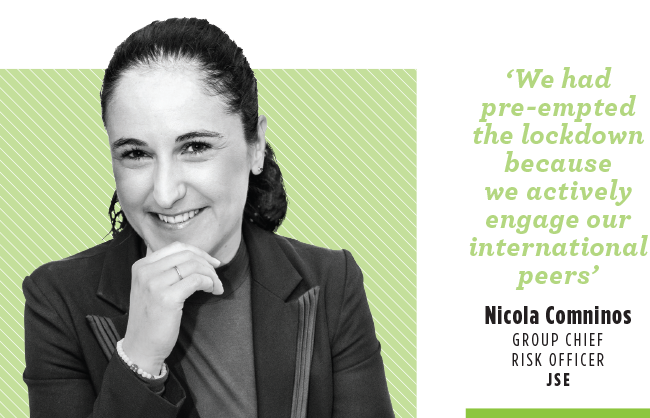When President Cyril Ramaphosa announced the national lockdown to combat the COVID-19 pandemic, some parts of SA’s economy came to a sudden, screeching halt. The JSE, however, remained open for business. The story of how it continued to operate as an essential service is one that highlights the JSE’s culture of problem-solving and forward-thinking.
‘While some global exchanges – like the New York Stock Exchange and the Chicago Mercantile Exchange – still have physical trading floors, the JSE does not,’ says Nicola Comninos, JSE: Group Chief Risk Officer. ‘No brokers trade from within our building. Everything is done electronically.’ That, she says, made the shift to a locked-down, work-from-home environment slightly easier. Yet there were still challenges to overcome.
‘In the pre-COVID-19 world, JSE-registered authorised users – or brokers – traded from their offices, situated geographically across the country,’ she says. ‘So all brokers, including their clients, such as asset managers in SA and globally – at least half of the JSE’s trading activity comes from offshore – were already connected to our markets electronically.’
When the national lockdown was enacted at midnight of 26 March 2020, nothing changed in that regard, then. The only difference was that instead of trading from their offices, those authorised users would trade from their homes. ‘That might sound immaterial, but it was very material from a business continuity point of view,’ says Comninos.
Several factors suddenly came into play. Did all authorised users have stable, fast data connections to access markets electronically from their homes? Did the compliance officers still have the required and appropriate oversight of traders’ activities? Would authorised users still meet the regulatory obligations from a trading, clearing and settlement perspective?
‘This is where we actively engaged with all the stakeholders in our ecosystem – from the brokers, to the asset managers running portfolios for a large number of investors, pension funds, and thousands of smaller wealth managers and financial-services providers,’ says Comninos. The exchange faced the significant technical challenge of ensuring all the players within its ecosystem – a ‘big, interconnected spider web of diverse participants required to keep markets operational’, as Comninos calls it – could remain open for business and able to work from their homes.
The JSE engaged with its clients and asked them to submit business-continuity plans, while the JSE Issuer Regulation team issued separate communication to sponsors and designated advisers to help listed entities remain compliant with the JSE’s listing requirements. The JSE’s Market Regulatory Function also issued communication to all authorised users that trade in JSE markets, to ensure they all had resilience plans in place. The JSE reminded authorised users of their regulatory obligations, such as compliance and settlement functions still having full oversight of the company’s activities.
But, as Comninos points out, the JSE was prepared. ‘We were ready,’ she says. ‘We had pre-empted the lockdown – not because we have a crystal ball, but because we actively engage our international peers. The Stock Exchange of Hong Kong, for example, had been in a state of lockdown for months already.’
The JSE team phased in its contingency plan over a few weeks. ‘We first tested running bonds-market operations remotely, then tested the derivatives markets, and then the equity market,’ says Comninos. ‘It wasn’t a “Big Bang” approach. After testing the markets separately, we then tested them all together and had team members from other functions across the group working remotely to make sure we could continue to operate as normal.’
It did – and it continues to do so. During the lockdown period, nearly all of the JSE staff members were able to work remotely, she says. ‘As the JSE, we fully supported the spirit and intent of the national lockdown and really wanted to honour the president’s direction by ensuring that our staff – and our stakeholders – could work remotely. And, of course, by ensuring that the markets stay open.’









